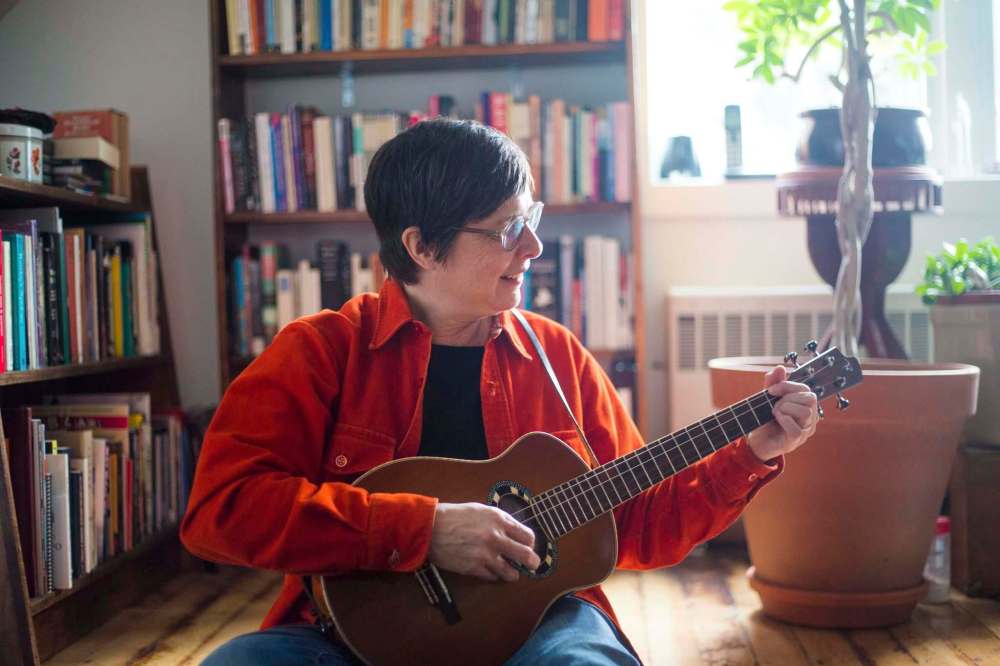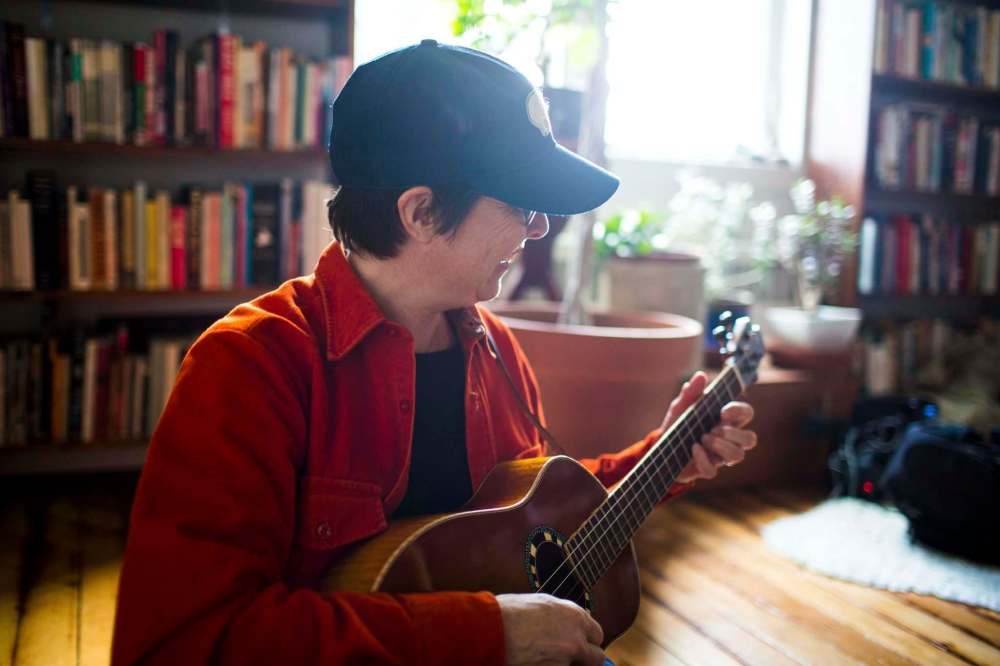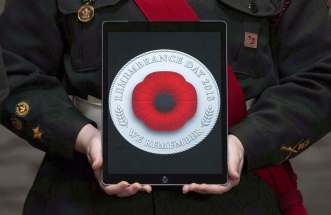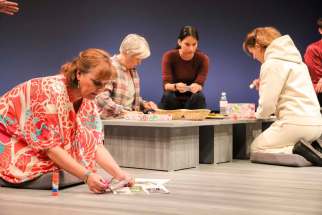Like a good reno Singer-songwriter Christine Fellows stripped songs down to the studs -- and a fresh, new sound emerged
Read this article for free:
or
Already have an account? Log in here »
To continue reading, please subscribe:
Monthly Digital Subscription
$0 for the first 4 weeks*
- Enjoy unlimited reading on winnipegfreepress.com
- Read the E-Edition, our digital replica newspaper
- Access News Break, our award-winning app
- Play interactive puzzles
*No charge for 4 weeks then price increases to the regular rate of $19.00 plus GST every four weeks. Offer available to new and qualified returning subscribers only. Cancel any time.
Monthly Digital Subscription
$4.75/week*
- Enjoy unlimited reading on winnipegfreepress.com
- Read the E-Edition, our digital replica newspaper
- Access News Break, our award-winning app
- Play interactive puzzles
*Billed as $19 plus GST every four weeks. Cancel any time.
To continue reading, please subscribe:
Add Free Press access to your Brandon Sun subscription for only an additional
$1 for the first 4 weeks*
*Your next subscription payment will increase by $1.00 and you will be charged $16.99 plus GST for four weeks. After four weeks, your payment will increase to $23.99 plus GST every four weeks.
Read unlimited articles for free today:
or
Already have an account? Log in here »
Hey there, time traveller!
This article was published 09/11/2018 (2587 days ago), so information in it may no longer be current.
Before Winnipeg singer-songwriter Christine Fellows had even put her previous album, 2014’s Burning Daylight, to bed, she had already begun work on some of the tracks for her new record, Roses on the Vine.
Concert preview
Christine Fellows
● Nov. 15, 8:30 p.m.
● Good Will Social Club
● Tickets $15, available at Showpass.com
Fellows is also playing the Morden Legion Hall on Nov. 16. Tickets are $20, available at Eventbrite.ca
The songs were originally created for a project with visual artist Shary Boyle titled Spell to Bring Lost Creatures Home (which is also a track on the new album). Boyle worked with overhead projections that were hand-animated and Fellows’ songs were designed to accompany them. Only the two of them were touring the show across the country in 2015, so Fellows had the added challenge of developing tracks that were sparse enough for just one person to play and easy enough for Boyle to attempt if they decided to swap roles.
Fellows knew these songs would eventually evolve into an album right from the start.
“I pretty much had that idea at the beginning when I started developing these songs that I would take them later and keep working on them, and I was doing another piece with a contemporary dance choreographer, so some of the songs from that ended up coming in here. Generally that’s how I work, it’s a collection of things that I do over time and then you start rearranging the repertoire and turning it into whatever it’s going to be,” says Fellows.
“It was actually a really good exercise for me in just editing, editing, editing, because that’s the magic of the writing process. Yes, getting the good idea is one thing, but just reefing away on them and cleaning all the garbage off and this is the first time I think I’ve made something that I could actually execute all of the songs on the record, just me standing there. I’ve never been able to do that, they’re always weird orchestrations or something, but I can do this on one instrument with my terrible arthritic hands,” she says, laughing.
Roses on the Vine is Fellows’s seventh full-length album and will be released Nov. 16 via the newly minted “label,” Vivat Virtute. Fellows says Vivat is less so a label than an umbrella her — and collaborator and husband John K. Samson’s — projects can live under; Samson has a longtime label he will continue to work with, but the pair have a lot of other things on the go, and wanted somewhere to put them.
“It’s not like we’re starting a label because that’s crazy,” says Fellows.
“I’ve never really felt comfortable in a situation with a label, it’s never been something that suits someone like me. I’m not making anybody any money, and I’m not going to do anything, it’s always going to be whatever the weird idea I come up with next.”
Fellows and Samson share a workspace in their home, and as the literal walls between their work have melted away, the creative walls have followed suit. Fellows was a producer and band member on Samson’s 2016 record, Winter Wheat, and he, in turn, is filling a similar role on Roses on the Vine.
For Fellows, Samson acts as a sounding board, the go-to guy when she’s in the trenches with a song and needs an outside perspective. Together they pull things apart and reconstruct them, “like breaking glass and putting it back together,” Fellows says.

One such song is Passage, which Fellows says they stripped “right down to the studs. And then put it back together with the studs on the outside and the walls on the inside, and the floor on the ceiling and the ceiling in the hallway.” What resulted is a hazy, and later folky, soundscape that rumbles beneath lyrics that present the thoughts of a first-person narrator dealing with the final stages of a fatal illness.
It’s delicate and, in a way, sweet, but there is also a thematic weight to it consistent with much of the other writing on Roses on the Vine.
Fellows has long been a proponent of telling real, raw and emotional stories of women, representing them in her music as often as possible, and this record is no different; many of the 13 tracks on the record are detailed vignettes inspired by the lives and work of women in the artistic community, as well as some of her family and friends.
While these topics and these characters are something Fellows has intentionally written about for much of her career, the themes feel more timely given the sweep of feminist movements across the world.

“I feel like (these ideas) have always been timely,” Fellows says.
“I remember being in university back in the ‘80s and hearing the term ‘date rape’ for the first time, and that idea, that concept blew my mind. And fast-forward and here we are now. And people talking about these experiences in their lives, like usually their first sexual experiences are coerced, it’s kind of incredible to hear this keep perpetuating for whatever reason,” she says.
“It’s also distressing to me too that it’s divisive because I don’t see it as something as man and woman, it’s human beings, we want the same things. Especially here in Winnipeg with First Nations women and girls being murdered or their cases not being take care of. To me that should be an affront to every person. It’s not just the First Nations community, not just women, it’s like, how can this not be freaking everybody out?”
And that thought process developed into one of the more inconspicuous, but no less important, themes of Roses on the Vine; the belief that we, as humans, need to be better at taking care of each other. It’s such a basic concept, but one that often requires a reminder.
“Maybe it’s not an explicit takeaway (from this album), but that idea of taking care of each other. I feel like it’s something that, for whatever reason, is the hardest thing for us to do.”

erin.lebar@freepress.mb.ca
Twitter: @NireRabel

Our newsroom depends on a growing audience of readers to power our journalism. If you are not a paid reader, please consider becoming a subscriber.
Our newsroom depends on its audience of readers to power our journalism. Thank you for your support.










